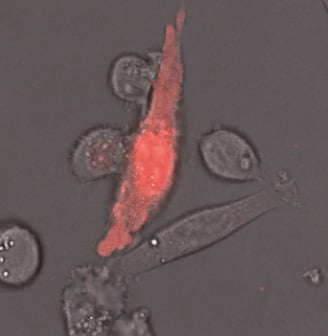Investigating ways to switch on Natural Killer cells
Posted: 23 May 2016 | Victoria White, Digital Content Producer | No comments yet
Researchers have identified a protein ‘brake’ within Natural Killer cells that controls their ability to destroy their target tumour cells…


A cytotoxic lymphocyte killing a cancer cell. CREDIT: Dr Misty Jenkins, Walter and Eliza Hall Institute
Walter and Eliza Hall Institute researchers are investigating ways to ‘switch on’ our Natural Killer (NK) cells.
Natural Killer cells exist to detect and then destroy any deviant cells in our bodies before those cells go on to develop into tumours or before infection spreads, said Dr Sandra Nicholson. Dr Nicholson and Dr Nicholas Huntington led the project.
“Natural Killer cells are a key part of our immune system that locate other cells posing a danger to health either because they are infected or because they are becoming a cancer cell,” Dr Nicholson said.
However, it is known that abnormal cells sometimes escape the immune system and develop into a cancer.
The researchers identified a protein ‘brake’ within Natural Killer cells that controls their ability to destroy their target tumour cells. In their research, they showed that when the brake was removed in an experimental model, the NK cells were better able to protect the body against metastatic melanoma.
Supercharging Natural Killer cells
Natural Killer cells rely on a growth factor called Interleukin 15 (IL15) to activate. Dr Nicholson and Dr Huntington’s research has shown that an inhibitor protein made inside the Natural Killer cells limits the ability of the NK cell to respond to IL15 and therefore kill cancer cells. By identifying for the first time how this protein inhibits NK cell responses, they now hope that a drug can be developed that will improve the NK cells’ response to this growth factor and help patients fight cancer with their own immune system.
“This is about learning how to activate the NK cells of the individual patient and boost their immune system to tackle the disease,” Dr Huntington said. “We are hopeful our research will lead to new immunotherapies that supercharge the body’s Natural Killer cell, and maintain it in a highly active state to more efficiently and specifically fight cancer.”
Related topics
Oncology
Related organisations
Walter and Eliza Hall Institute


